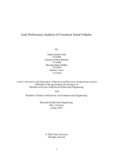Link performance analysis of Unmanned Aerial Vehicles
Abstract
Unmanned Aerial Vehicles (UAVs) play a vital role in the growing technological
advancements. Researchers have been trying to utilize UAVs as a replacement to static base
stations. However, adjustments need to be made in order to form a seamless wireless
connection with ultra-reliability and low latency. In this thesis, we explore the idea of
implementing flying base stations in conjunction with MEC architecture. We provide
descriptions of Mobile Edge Computing and Caching and their need in achieving a secure
connection for time sensitive applications while simultaneously reducing the energy
consumption of UAVs. Furthermore, we execute mathematical models for data rate,
transmission delay, time consumption and energy consumption using Non-Orthogonal
Multiple Access (NOMA) techniques and compare their simulations at different Signal to
Noise Ratios (SNRs) for both uplink and downlink transmissions. From our proposed model
we derived a numerical result which showed that at SNR 30 dB the total delay is 0.16% more
than the processing delay.

